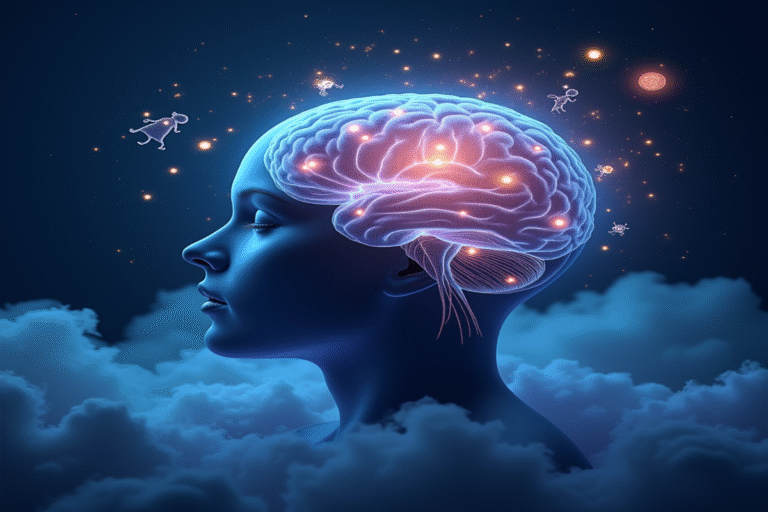Have you ever wondered why your friend can recount their dreams in vivid detail while you wake up with no recollection of your nighttime adventures? This fascinating difference in dream recall isn’t just random chance—it’s rooted in neuroscience, psychology, and even personality traits.
The Brain’s Dreamscape: How Dreams Form
During sleep, our brains cycle through different stages, with REM (Rapid Eye Movement) sleep being the period when most vivid dreaming occurs. During REM sleep, the prefrontal cortex—responsible for logical thinking—becomes less active, while the amygdala and hippocampus—centers for emotions and memory—become highly active.
This neurological pattern creates the perfect environment for dreams, but whether we remember them is another matter entirely.
Why Some People Remember While Others Forget
1. Waking Patterns Make All the Difference
Research published in the journal Neuropsychopharmacology found that people who naturally wake up during REM sleep are significantly more likely to remember their dreams. If you wake up during or immediately after REM sleep, you are essentially “catching your brain in the act” of dreaming.
Those who sleep deeply through the night and wake up during non-REM sleep are much less likely to recall their dreams, as dream memories fade extremely quickly if not immediately encoded.
2. Brain Chemistry and Activity
Some people naturally produce higher levels of acetylcholine—a neurotransmitter associated with memory formation—during REM sleep. These “high recallers” show increased activity in the temporo-parietal junction, a brain region involved in attention to external stimuli.
Interestingly, brain scans reveal that frequent dream recallers have more activity in the medial prefrontal cortex and temporo-parietal junction even while awake. This suggests that dream recall is influenced not just by sleep, but by how our brains function in general.
3. Personality Traits Play a Role
Those who remember dreams tend to score higher on measures of:
- Openness to experience – They are more receptive to their inner experiences.
- Thin boundary personality – They are more likely to blend thoughts, feelings, and impressions.
- Creative thinking – They make more unusual associations.
Meanwhile, those with more analytical personalities might unconsciously dismiss dreams as unimportant, making them less likely to encode these memories.
4. Sleep Quality Matters
Poor sleep quality characterized by frequent awakenings can actually increase dream recall, as each awakening provides an opportunity to encode dream memories. However, these dreams are often more negative in content—perhaps explaining why people with conditions like insomnia or sleep apnea report more disturbing dreams.
The Neuroscience of Forgetting Dreams
Dream amnesia is actually our brain’s default state. Most dreams are forgotten due to:
- Low levels of norepinephrine during REM sleep, which is necessary for memory storage.
- The rapid neurochemical shifts that occur when transitioning between sleep and wakefulness.
- The fact that dreams are not processed the same way as conscious experiences.
In essence, remembering dreams is the exception, not the rule. Your brain must overcome significant neurological hurdles to store these fleeting experiences.
Can You Improve Dream Recall?
If you are interested in remembering more dreams, scientific studies suggest several effective approaches:
- Keep a dream journal by your bed and write down any fragments immediately upon waking.
- Repeat to yourself, “I will remember my dreams” before sleeping—this intention-setting can help.
- Ensure adequate sleep duration, since sleep deprivation reduces REM sleep periods.
- Avoid alcohol before bed, as it suppresses REM sleep.
- Practice mindfulness meditation, which has been shown to increase dream recall.
Perhaps most intriguing is that simply caring about your dreams increases recall. Those who value their dreams and consider them meaningful tend to remember more of them—suggesting that attention and interest can shape our access to this mysterious aspect of consciousness.
The Evolutionary Puzzle
Why would some people remember dreams while others forget them? Some scientists theorize that dream recall may offer adaptive benefits, allowing individuals to integrate emotional experiences, solve problems, or gain creative insights. Others suggest it’s simply a byproduct of differing brain structures, with no specific evolutionary advantage.
What is certain is that the science of dream recall offers a fascinating window into the remarkable complexity of our brains—even when we’re not consciously aware of it.





